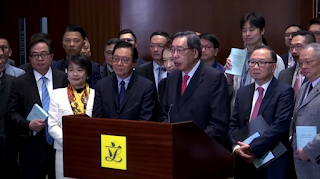ARTICLE AD BOX
The Hong Kong government announced the details and penalties of Article 23 of the Basic Law on March 8. Among them, treason is punishable by life imprisonment, and failure to report information can be punished by 14 years. The Hong Kong government even made an exception and arranged for the Legislative Council to start the first and second reading procedures for the legislation on the same day, so that the Legislative Council members who are both deputies to the National People's Congress and members of the Chinese People's Political Consultative Conference must urgently return to Hong Kong for deliberation. Why is the Hong Kong government so eager to legislate? What are Beijing’s plans?
In order to speed up the progress of legislation on Article 23 of the Basic Law, the Hong Kong government published the provisions of the "Maintenance of National Security Bill" this Friday (March 8) . The more than 200 pages of provisions include the definitions of various crimes, Details and associated penalties. Among them, those involved in treason, inciting the Chinese armed forces to rebel, or colluding with foreign forces to destroy infrastructure can be sentenced to life imprisonment; those who engage in espionage or use computers and other systems to endanger national security can be sentenced to 20 years in prison; those who involve overseas interference, participation in or support of overseas intelligence organizations, and failing to report treasonable acts are punishable by fourteen years in prison.
In addition, "behavior with seditious intent" is listed, including postings and displays that cause hatred towards China and Hong Kong government agencies, or contempt for Chinese residents, etc., without proving the intent to incite, and can also be sentenced to 7 years in prison; if it involves colluding with foreign forces, If the crime is increased by one level, if he colludes with foreign countries to publish publications with seditious intentions, the prison term will be increased from seven years to ten years.
The vague definition of treason in Article 23 of the Basic Law makes it easier for people to be criminalized than the National Security Law
Exiled former member of the Hong Kong Legislative Council, Hui Chi-feng, described Article 23 of the Basic Law as a law that further deprives Hong Kong people of their human rights. The definition of criminal acts is vague and different from the perceptions of Hong Kong people. Compared with the National Security Law, it is easier for people to fall into guilty and sentenced.
Xu Zhifeng said: "Especially for treason, Hong Kong people are very supportive of Taiwan. They have purchased large quantities of Taiwanese fruits and foods that are prohibited from import by China to show their support for Taiwan. These economic supports have even led to the separation of Hong Kong people to serve as volunteers in Ukraine. In the future, If you do not side with the Chinese camp due to geopolitical issues, you may be regarded as treason and sentenced to life imprisonment. This approach puts Hong Kong people in extreme danger and is extremely crazy."
Extending detention, banning access to lawyers, and restricting activities are the same tactics used to deal with dissent in the mainland.
Xu Zhifeng said that the Hong Kong government's proposal to extend the detention period of suspects from 48 hours to 14 days also limits the opportunity to seek individual lawyers and action. It is no different from the methods used by mainland China to deal with dissidents, and is a violation of human rights. suggestion.
Xu Zhifeng said: "You are not allowed to see a lawyer, and you are not allowed to see a lawyer by name. Representatives can only meet pro-government lawyers. This is a change in Hong Kong's criminal procedures. I also found that among the new bail conditions, there are One of the restrictions on the activities of arrested persons is to prevent those who have been released on bail from leaving their homes, which means house arrest. Like Chinese dissidents who are placed under residential surveillance, Article 23 is completely in line with China's practice and fundamentally changes the common law system. .”
Commentary: Restrictions on movement of arrested persons and selection of lawyers deviate from international standards
Pan Jiawei, a visiting researcher at the University of Tokyo who has been engaged in human rights work for many years, also said that Article 23 of the Basic Law restricts arrested persons’ access to lawyers and rights of movement, which is very similar to China’s methods of dealing with dissidents, deviates from international standards, and seriously violates human rights.
Pan Jiawei said: "The sentences that can be sentenced under Article 23 in Hong Kong are very serious. What is incitement? What is state secrets? What is collusion with foreign forces? It is the government that has the final say. Just like the situation in mainland China. , the biggest problem is that it gives the police a lot of space, it will become a very serious pocket crime, and there is no way to see a lawyer, and there is no way to be protected. It is exactly the same as the mainland's approach, and it is a very serious violation of human rights. .”
Beijing allows dual-career Hong Kong MPs to leave Beijing to review 23 articles
This time, the Hong Kong government made an exception and started the procedures of gazetting, first reading and deliberation of legislation at the same time, requiring many members of the two sessions in Beijing to take leave and return to Hong Kong for the meeting. Current affairs commentator Samp said that Beijing's desire to complete the review of Article 23 of the Basic Law, a draconian law, as soon as possible is related to geopolitics.
Samp: "It is definitely very related to the international situation. There may be nuclear threats in South Korea's general election in April, and then the US general election on November 5. I hope that in this chaotic situation, I can take one more step. It (China) It is necessary to completely resolve Article 23 before the new (U.S.) president takes office, creating an established fact and conducive to the game between the United States and China. This is a method commonly used by the Communist Party. The more chips it has, the more it can negotiate with the other party. "
Samp said that Article 23 of the Basic Law is not the end point of the suppression of Hong Kong people, but a halfway station. He believes that Beijing and the Hong Kong government will take other actions before the end of the year to achieve the greatest intimidation effect, prevent Hong Kong, and at the same time Eliminate the will to resist within China.
.png)
 8 months ago
2
8 months ago
2









 English (US)
English (US)